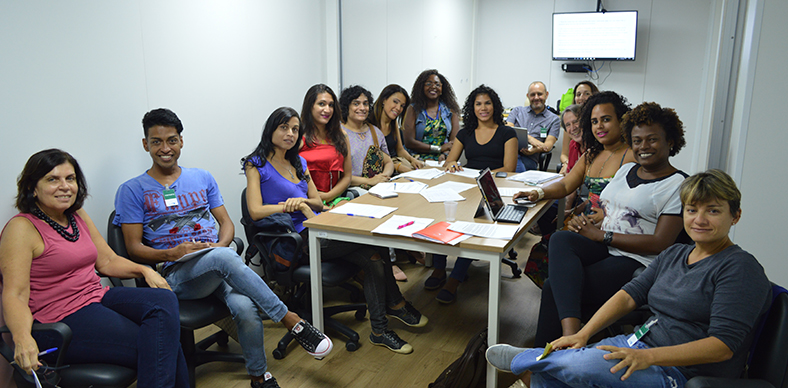GROUP OF REFLEXION WITH TRANS POPULATION DISCUSSES STRATEGIES OF IMPREP PROJECT
Text written by
Leonardo Linconl (Ascom | ImPrEP)*
Community mobilization and communication strategies to disclose the Pre-Exposure Prophylaxis (PrEP) for population of transvestite women and transgender women, were the main agenda of the meeting promoted by ImPrEP, in Rio de Janeiro, at the head office of the Foundation for the Scientific and Technological Development in Health (Fiotec), on last April 18. The Project gathered representatives of several organizations and regions of the country to reflect about such matters, and also discussed the questionnaire that will be applied in the Transgender population in the 12 cities where the project is in implementation.
PrEP and education among pairs
The meeting had as start point a conversation circle about the knowledge of the participants in the meeting about PrEP. The group showed to be well informed about the use, efficiency, and results of the strategy, and reported to have received the information through PrEP Brazil and PrEParadas projects. Next, the participants reported that the majority of the transvestite women and transgender women do not know PrEP, or when they recognize the name they suspect of its existence or efficiency, also informing that some of them consider they are “puppets” for the researchers in such projects. A consensus among the participants is that, especially among the sex professionals, there is a lack of interest in the prophylaxis due to the believe they are already infected.
The high degree of mistrust described let clear that the transgender women or users of the medicine are key agents in the disclosure of information to such populations. Therefore, investing in the strategy of education among pairs, stimulating the contacts through multipliers of information among the transvestite women and transgender women, especially regarding sex professionals, is essential. The approach by similar ones, including regarding the age and practices, will facilitate the creation of trust bonds.
Social networks and applications
The group indicated Facebook and WhatsApp as the most used communication tools, warning that the “big texts” shall be avoided. Additionally, it was emphasized that even in the social networks, the groups have cuts and specific interests, and it is required to respect such plurality, especially regarding the “passability”. Regarding the use of hormones, for example, not rarely the start point is a superficial research in the social networks when the access thereto is possible.
A new proposal to put PrEP more in evidence, disclosing information and making Truvada more popular, would be to disclose the image of the tablet through sexy transgender characters influent in the social media, using YouTube, for example. In such case, channels already existing and that are accessed by such group would be used, such as: Mandy Candy, Põe na Roda, Chitara de la Costa, and Divagina Show.
Another question very discussed was the lack of preparation of the professionals of the Family Health Centers (PSF), which many times results in the prejudicial treatment and/or embarrassing situations, being the most common the refusal of using their social names. To the group, disclosing the use of the social name, an old claim in SUS, would have a very important role on the welcoming, and, consequently, on the incentive to the care with health.
Assessment of the Questionnaire
Although they have positively assessed the electronic questionnaire prepared by ImPrEP Project, the group pointed out that some groups of transgender women would be at the margin of the research due to difficulties in accessing the electronic media, especially the population of transgender women in situation of greater vulnerability. The participants indicated that cell phone would be the most efficient vehicle to reach a larger layer of such population, since through it the access link to the questionnaire could be distributed, including through groups in social networks such as Facebook and applications such as WhatsApp. Another point highlighted was that, in general, there is good willingness to answer to online questionnaires, provided that the language is simple and objective.
*With the collaboration of Juana Portugal (INI / FIOCRUZ), Marcos Benedetti (ImPrEP), and Luciana Kamel (INI/FIOCRUZ)
Credits of Images: Gustavo Amaral (Fiotec)




